【NEWSLETTER Vol.3】DIGITAL & INNOVATION PROMOTION PROJECT
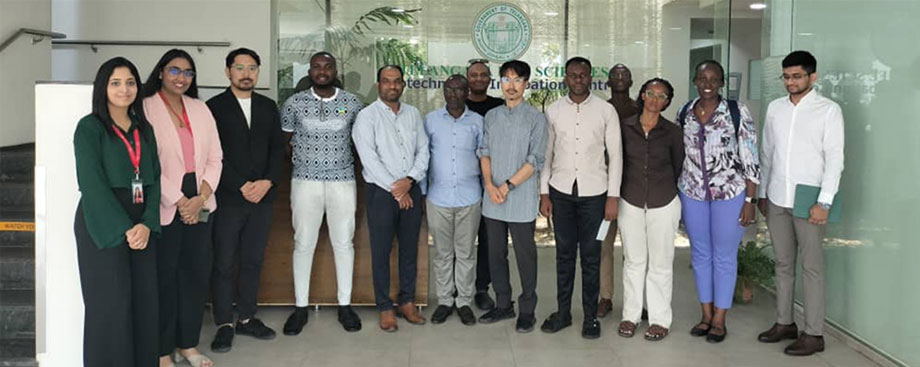
3rd Country Visit (India): Group photo at Biotechnology Incubation Centre (Hyderabad)
5TH JOINT COORDINATION COMMITTEE MEETING HELD: DISCUSSED ACHIEVING PROJECT OUTCOMES AND MAXIMIZING IMPACT
On December 17, 2024, the 5th Joint Coordination Committee meeting (JCC) was held at the Digital Transformation Center(*1) in Kigali City. At the JCC, 19 project stakeholders from Rwanda and Japan reviewed the progress of each output and agreed to further expedite and streamline activities to achieve outcomes and maximize impact. In addition, the Objectively Verifiable Indicators (OVIs) for each outcome were reviewed in line with the goals of the Government of Rwanda's ICT Sector Strategic Plan (SSP) 2024-2029, which was released on August 10, 2024. The project is determined to continue its work toward the realization of the outcomes.
*1: Project and site managed jointly by the Rwandan Ministry of ICT and Innovation of (MINICT) and the Deutsche Gesellschaft für Internationale Zusammenarbeit (GIZ)
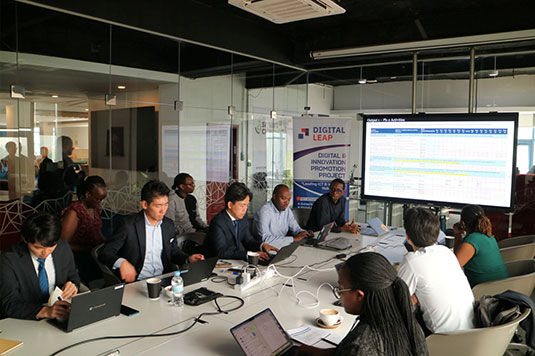
Scenes from the 5th JCC
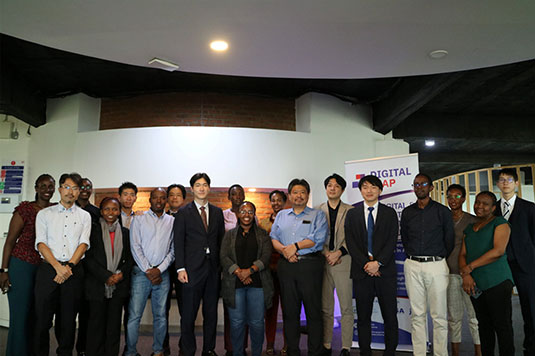
CONDUCTED TRAINING OF TRAINERS FOR INNOVATION HUBS’ STAFF AND STARTUP SUPPORT PROGRAMS
With the aim of strengthening the capacity of 6 staff members of the innovation hubs (Hanga Hub) in Musanze and Huye, the secondary regional cities, to autonomously conduct startup support programs in the future, the project conducted a training of trainers (ToT) from mid-December 2024 to mid-January 2025. The staff members who participated in the ToT learned about program management, communication skills, and design thinking, etc. through a 5-day group session (December 16-20, 2024). In order to put the knowledge learned into practice, a business idea contest was planned and held on January 14 and 17, 2025 in Musanze and Huye, respectively, on the theme of "Innovation for a Sustainable Future.” Contest participants presented their business ideas in line with local needs, such as agricultural drone-based seeding services and non-biodegradable waste management solutions. Although there were challenges in time management and participant engagement, the staff of the innovation hubs are expected to improve their responsiveness not only as individuals but also as a team through the planning and operation of various programs and events in the future.
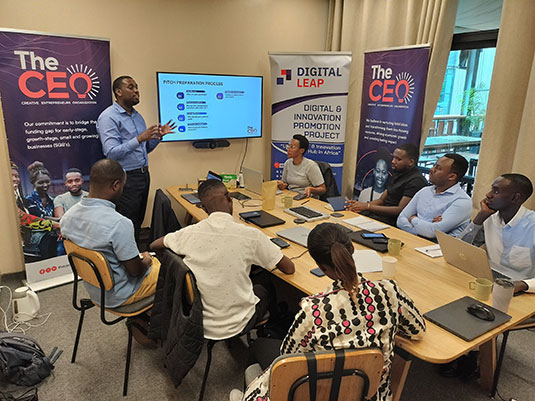
A scene from ToT group session
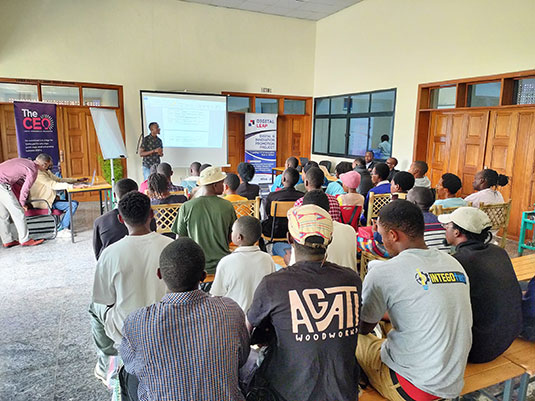
A scene from business idea contest
From February 21 to March 11, 2025, the Ideation program was held at the innovation hubs as part of the Rwandan government's startup support program. A total of 100 people participated in the program and 62 business ideas were show-cased. At the end of the program, a pitching event was held, and after judging, 19 ideas were selected to move on to the subsequent Pre-Incubation program. Furthermore, on April 29-30, a hackathon was held at the Musanze Innovation Hub on the theme of "Issues hindering the growth of agriculture and tourism in Musanze”. Through these efforts, the project will further improve the support environment for ICT entrepreneurs and strengthen the system for producing entrepreneurs.
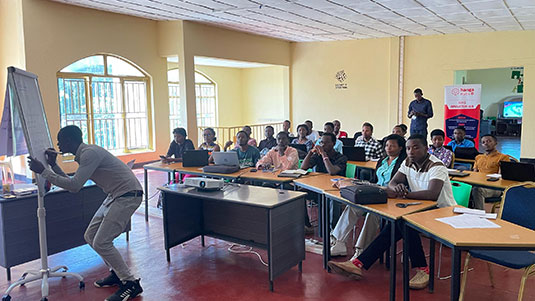
A scene from the Ideation program in Huye
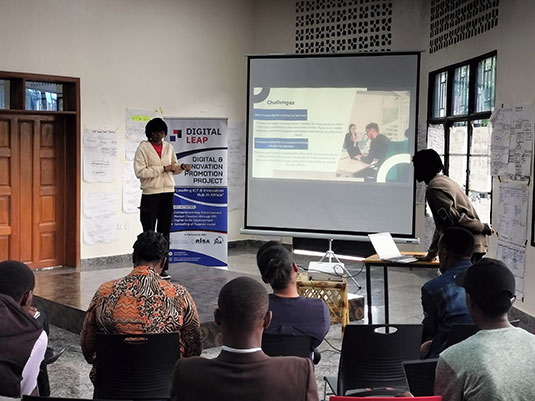
A scene from a presentation at the Hackathon in Musanze
EXPLORING SUSTAINABLE BUSINESS MODEL FOR INNOVATION HUBS THROUGH 3RD COUNTRY VISIT (INDIA)
In accordance with one of the key goals of the project —to develop a sustainable business model for each of the innovation hubs in Musanze and Huye — the project conducted a 3rd Country Visit in India from May 13 to 20, 2025. This visit aimed to learn from best practices in other countries and to build bilateral network for future collaboration. India's startup ecosystem is the third largest in the world after the U.S. and China, with more than 170,000 startups certified by the government as of May 2025, and has produced more than 100 unicorn companies. With the cooperation of Mr. Takemura (representative of FabLab Hamamatsu/TAKE-SPACE), a short-term expert on FabLab operations, and the JICA India office, the participants toured 5 cities (Mumbai, Pune, Hyderabad, Cochi, and Delhi) and visited a total of 8 major entrepreneur support organizations (ESOs) in each city. As a highlight, in Hyderabad, the participants visited the T-Hub, one of the world's largest innovation hub and startup ecosystem enabler, and also a sub-project implementing agency of the “Telangana Startup and Innovation Ecosystem Strengthening Project”, an ODA loan project, funded by JICA. The training was very meaningful, as they learned that India's huge startup ecosystem is formed by strong government initiatives and the involvement of various stakeholders. For more information, please see the press release dated May 22, 2025 by the JICA India Office (https://www.jica.go.jp/english/overseas/india/information/press/2025/1568359_59609.html).
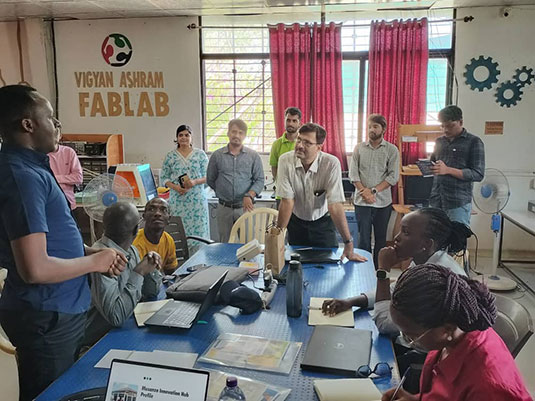
Discussion at Vigyan Ashram (Pune)
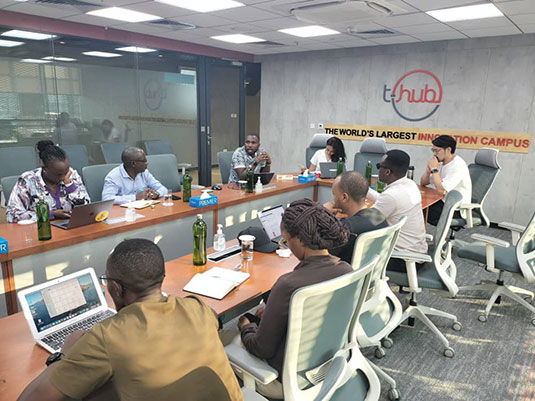
Discussion at T-Hub (Hyderabad)
DEVELOPED AND INTRODUCED E-PORTFOLIO MANAGEMENT SYSTEM FOR MINISTRY OF EDUCATION (MINEDUC) AS PROOF OF CONCEPT
As the 2nd proof of concept (PoC: to test the feasibility of a new service) for the digitization of administrative services, the project supported the development of an e-Portfolio Management System for recording and viewing the learning and research achievements of students and faculty at the Rwanda Polytechnic University (RP), which was released on May 30, 2025 (https://eport.rp.ac.rw/).
This platform is expected to facilitate information sharing and feedback among students and faculty members, and provide a function to act as an electronic resume to help students in their job search. Out of more than 70 applicants, he PoC was awarded to ‘Strettch,’ a tech startup from Kigali, through a competitive bidding process based on the Public Procurement for Innovation (PPI) modality. The company is comprised of recent graduates of the Rwanda Coding Academy(*2), which provides advanced programming skills education in Rwanda.
The PPI is lowering the barriers for Rwandan startups to entry into public procurement while creating an environment in which startups can compete on equal terms with existing companies. The establishment of PPI scheme is a remarkable achievement for the Rwandan government in terms of strengthening its innovation ecosystem and startups development.
*2: Programming school jointly established by the Rwandan government (Ministry of Education and Ministry of Finance) and the Korea International Cooperation Agency (KOICA)
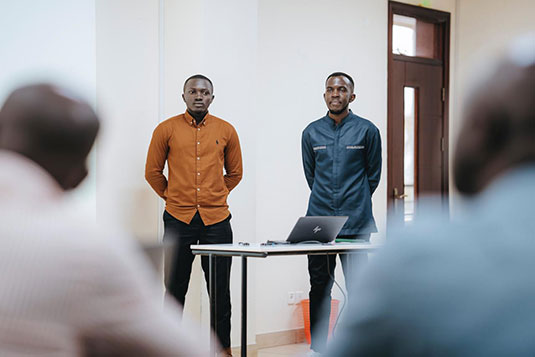
Stretch's presentation at the project kick-off meeting
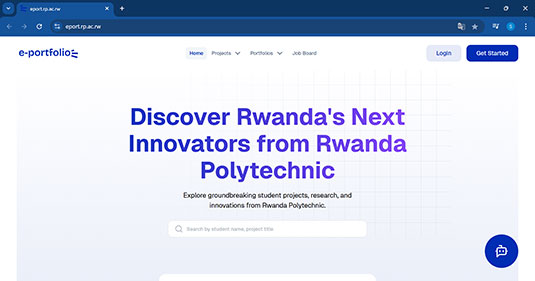
Website of e-Portfolio Management System
Currently, based on the experience gained from the 1st and 2nd PoCs, the project counterpart, Rwanda Information Society Authority (RISA), is taking the lead in preparing for the implementation of the 3rd PoC (Ministry of Environment (MoE): real-time weather data distribution system) and the 4th PoC (Ministry of Finance and Economic Planning (MINECOFIN): e-public procurement system), as well as expanding to other donor-supported projects. Through support for these initiatives, the project will contribute to the early realization of the digitalization of administrative services as set forth by the Rwandan government.
COMPLETED 2ND BATCH OF EXECUTIVE LEADERSHIP DEVELOPMENT PROGRAM FOR ICT OFFICERS FROM RWANDAN MINISTRIES
From November 1 to December 6, 2024, the 2nd batch of the Executive Leadership Development Program was conducted for 73 ICT and digital officials (50 men and 23 women) in government ministries and affiliated agencies in Rwanda. The training curriculum for negotiation and public speaking skills was added to the content of the previous year's program, and group training sessions were held once a week for a total of six sessions at a venue in Kigali City to improve the soft skills of staff and strengthen teamwork across workplaces and positions. The project is currently preparing for the implementation of the 3rd batch of the program, and as an attempt to promote cultural transformation in the ICT sector, it’s also planning to conduct an online session for all participants in all three batches of the program to reflect on what they have learned.
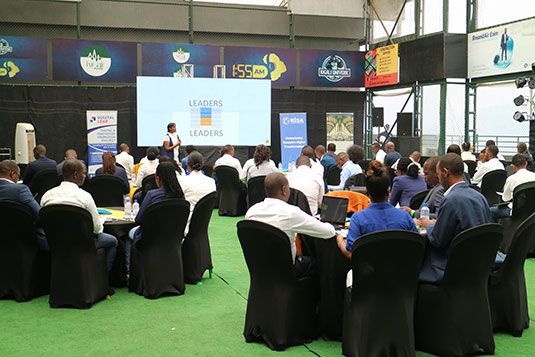
Group training session
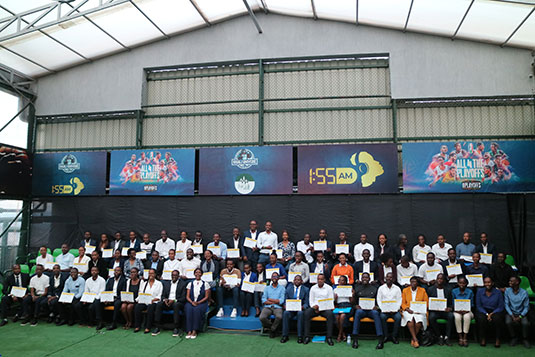
Commemorative photo after the training
COLUMN 3: VARIOUS ICT SECTOR INITIATIVES IN RWANDA
JICA Rwanda Office has been co-chairing the ICT Sector Working Group(*3) since 2017, and has been working with the MINICT, development partners, and various projects/initiatives to gather information and recommend measures. This column introduces some of the main initiatives and implementing agencies for a better understanding of what specific initiatives and implementing agencies exist and what activities are being undertaken.
*3: Subcommittee for regular policy dialogue among government agencies, development partners, and other stakeholders in Rwanda's ICT sector
1) Digital Solutions for Sustainable Development (DSSD) is a project being implemented by GIZ. This project aims to promote sustainable development in Rwanda using digital technology and is characterized by a wide range of support to government agencies, private companies, and citizens. In particular, the expansion of digital public services in collaboration with MINICT and RISA, and the development of an environment that enables the use of digital technologies through the establishment and operation of the Digital Transformation Center mentioned above, are relevant to our project and require close collaboration and coordination.
2) Revenue Improvement Action Plan (RIAP) is an initiative supported by the World Bank (WB). It is particularly noteworthy that the plan aims to improve the investment environment by introducing an e-tax system to increase transparency and efficiency of tax revenue management and to optimize the tax burden on businesses. Although there is no direct link, our project must keep abreast of development as it aims to support entrepreneurs and create markets in the ICT sector.
3) Digital Acceleration Project (DAP) is a project of WB and Asian Infrastructure Investment Bank (AIIB). RISA and the Rwanda Development Bank (RDB) are the implementing agencies for this massive project, which aims to expand broadband access, strengthen digital public services, and promote digital innovation. Since the latter two projects overlap with our project's objectives, the RISA staff member in charge of the project will be particularly required to be able to share information among staff members and coordinate among the projects.
4) Rwanda Coding Academy (RCA) is a programming school jointly established by the Rwandan government and KOICA to provide an educational environment for advanced programming skills and to strengthen human resource development in the field of ICT in Rwanda. Strategic partnerships with regional hubs are needed to ensure that RCA graduates become entrepreneurs and, in the future, mentors and supporters of the next generation of entrepreneurs.
Other ICT initiatives are also underway at various layers, such as the Start and Improve your Business (SIYB)/Digitalise Your Business (DYB) training program that MINICT is promoting with the International Labour Organization (ILO), the Hanga Hubs project by RISA and the European Union (EU), and the Drone Operation Center (DOC) project by RISA and the French Development Agency (AFD).
To avoid duplication of efforts among the various programs supported by JICA and other development partners, our project will continue to work to strengthen the capacity of the government staff to orchestrate ICT initiatives.
■Project Information
JICA Project Page
https://www.jica.go.jp/oda/project/202005081/index.html
JICA Rwanda Office X(Twitter) account
@JicainRwanda
■Contact Us
E-mail: sshonai.jica@gmail.com
Digital & Innovation Promotion Project Public Relations (Attn: Shonai)
